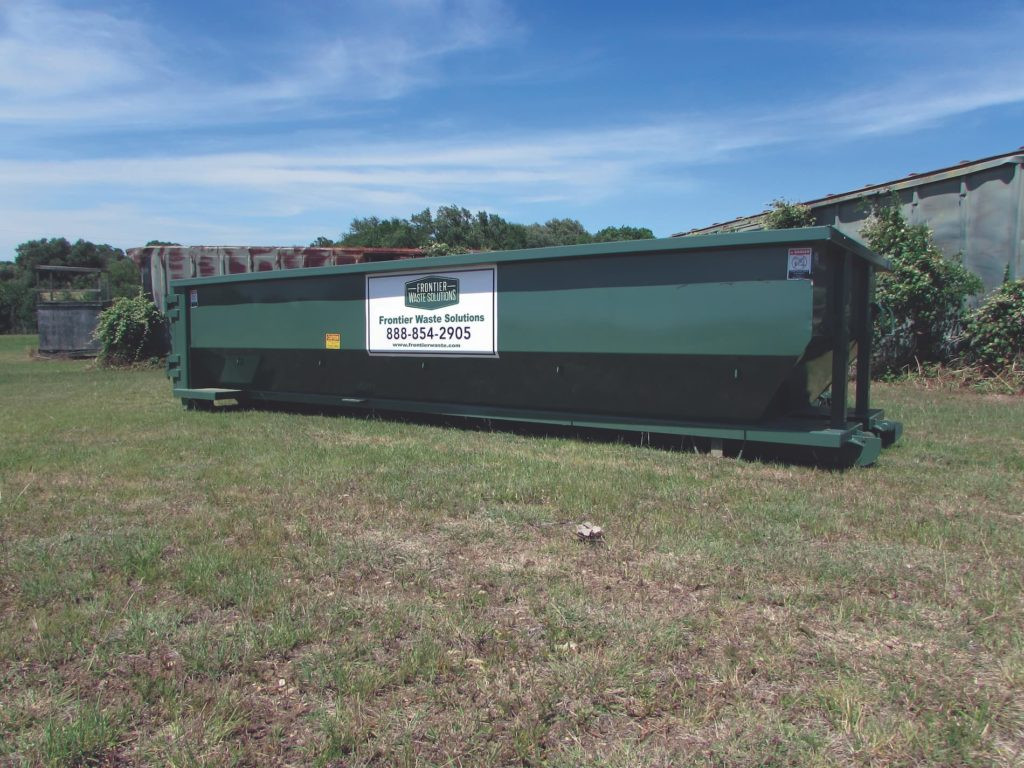Disposing of rocks in your yard can be tricky, but don’t worry; rockscapes.net offers multiple sustainable solutions. Instead of letting those leftover stones become a burden, explore eco-friendly disposal methods and creative reuse ideas. From repurposing projects to responsible disposal options, discover how to manage your rocks while enhancing your landscape with stone features and yard waste solutions.
1. Renting a Roll-Off Dumpster for Rock Disposal
Renting a roll-off dumpster offers a convenient solution for handling a large volume of rocks from your yard, especially after landscaping projects. Frontier Waste Solutions, for example, delivers the dumpster to your location and picks it up once you’ve loaded it, simplifying the disposal process. This method is suitable for bulk disposal, ensuring the rocks are disposed of properly.
- Bulk Disposal: Ideal for large quantities of rocks, making it perfect for significant landscaping projects.
- Convenient Delivery and Pickup: Companies like Frontier Waste Solutions handle the logistics, saving you time and effort.
- Proper Disposal Guarantee: Ensures that the rocks are disposed of in an environmentally responsible manner.
However, there are also potential downsides to consider:
- Loading Required: You’ll need to load the rocks into the dumpster yourself, which can be physically demanding.
- Weight Limits: Dumpsters have weight restrictions, so you need to be mindful of the amount of material you’re loading.
- Cost: While convenient, renting a dumpster can be more expensive than other disposal methods, especially if you only have a small amount of rocks.
 Roll-off dumpster filled with rocks for disposal
Roll-off dumpster filled with rocks for disposal
Alt text: A 20-yard roll-off dumpster overflowing with rocks, ideal for disposing of a large volume of landscaping materials.
2. Utilizing Free Classifieds for Rock Disposal
Checking websites like Freecycle, Craigslist, and other classifieds can connect you with contractors or landscapers who may need rocks for their projects, providing a free disposal solution. These individuals often repurpose rocks for various construction or landscaping needs, offering an environmentally friendly way to get rid of them. According to research from Arizona State University’s School of Sustainability, community-based exchange platforms like Freecycle significantly reduce landfill waste by connecting people with unwanted materials to those who can reuse them.
- Free Disposal: Eliminates disposal costs by giving the rocks away to someone who needs them.
- Recycling Solution: Promotes recycling by repurposing the rocks for new projects.
- Community Connection: Connects you with local contractors or landscapers who can benefit from the materials.
Keep in mind that there are potential drawbacks:
- Research Effort: Finding someone who needs the rocks may require some time and effort on your part.
- Proper Disposal Uncertainty: You can’t guarantee that the rocks will be disposed of properly if the recipient isn’t experienced.
- Not for Bulk Amounts: This method is best suited for smaller quantities of rocks.
3. Disposing of Rocks Yourself at a Local Facility
Transporting the rocks to a local landfill or dump yourself offers a direct disposal method, especially for those with access to a suitable vehicle. Before heading out, it’s crucial to verify any restrictions or fees with the facility. According to the EPA, landfills have specific regulations regarding the types of materials they accept to prevent environmental contamination.
- Cost Control: You avoid dumpster rental or removal fees, making it a low-cost option for small amounts of debris.
- Flexibility: You can dispose of the rocks at your own pace and on your own schedule.
However, there are also challenges to consider:
- Physical Labor: This method requires physical effort to load, transport, and unload the rocks.
- Location Limitations: The nearest dumping site may be located far from your home.
- Dumping Fees: You’ll likely have to pay fees for dumping the rocks at the facility.
- Unsuitable for Large Loads: This method is not practical for disposing of large quantities of rocks.
- Multiple Trips: You may need to make several trips if you have a significant amount of rocks.
 DIY rock disposal using a truck
DIY rock disposal using a truck
Alt text: A pickup truck loaded with rocks for DIY disposal at a local landfill or dumping site.
4. Hiring a Junk Removal Company for Rock Disposal
Engaging a junk removal company offers a hassle-free solution, where they handle the entire process from loading to disposal. Service fees can vary, so it’s important to get a quote beforehand. Many companies also prioritize donating or recycling reusable items.
- Convenience: The company handles all the heavy lifting and disposal logistics.
- Recycling and Donation: Many companies recycle or donate items whenever possible.
- Scheduling Flexibility: You can schedule the removal on a day that’s convenient for you.
However, there are also potential drawbacks:
- Cost: This can be an expensive option, especially for large quantities of rocks.
- Price Variability: The final price may be subject to change after on-site evaluation.
- Recycling Uncertainty: Not all companies guarantee recycling or donation of items.
- Home Presence Required: You need to be present when the company comes to remove the rocks.
5. Giving Away Rocks to Passers-By
Placing rocks with a “free” sign by the roadside or in a park can be an effective way to get rid of small amounts. This method works best if the rocks are easily accessible to anyone interested. This option involves minimal effort and cost.
- Cost-Effective: It’s a free way to dispose of rocks.
- Minimal Effort: Very little work is involved on your part.
- Suitable for Small Amounts: Ideal for getting rid of small quantities of rocks.
However, there are also limitations:
- No Guarantee: There’s no assurance that someone will take the rocks.
- Not Ideal for Public Spaces: Leaving the load in public places may not be appropriate.
- Unsuitable for Bulk Disposal: This method is not practical for disposing of large quantities of rocks.
 Sign indicating free rocks for passers-by
Sign indicating free rocks for passers-by
Alt text: A sign placed next to a pile of rocks, advertising them as free for passers-by to take.
6. Cost Comparison of Rock Disposal Options
The cost of disposing of rocks varies depending on the method you choose and the amount of rocks you have. Let’s compare the costs of different disposal options:
| Disposal Option | Cost | Notes |
|---|---|---|
| Junk Removal Company | $275-$600 per trip | Based on volume; can hold up to 2 tons of rocks |
| Dumpster Rental | $329-$825 (average $525) | Charged by the number of days; most dumpsters can hold up to 10 tons of rocks |
| Landfill Dumping Fees | $32-$50 per ton | Good option for those with their own transportation |
| Giving Away Rocks for Free | Free | Requires effort to find someone who wants them; best for small to moderate amounts of rocks |
Junk Removal Company: Typically charges based on the volume of space your rocks occupy in their truck. The average cost is $275-$600 per trip and can hold up to 2 tons of rocks.
Dumpster Rental: Charged by the number of days you keep the dumpster. Prices range between $329-$825, making dumpster rentals an average of $525. Most dumpsters can hold up to 10 tons of rocks.
Landfill Dumping Fees: The cost of dumping fees at the landfill or transfer station is typically $32-$50 per ton.
Giving Away Rocks: The most cost-effective option, as you will not have to pay for anything. However, this method is not guaranteed to get rid of all your rocks, and you may have to put in some effort to find someone who wants them.
7. Exploring Rock Recycling Options
Recycling rocks can be a sustainable way to dispose of them. Here are some options for recycling rocks:
- DIY Projects: Repurpose rocks and gravel for DIY projects around the house or yard.
- Local Landscape Supplier: Check with your local landscape supplier or garden center to see if they can recycle them for you.
- Charitable Organization: Donate your rocks to a local charitable organization, such as Habitat for Humanity ReStore, which may be able to use them for their construction projects.
7.1. Using Rocks for DIY Projects
Repurposing rocks and gravel in DIY projects around your home and yard can be both creative and practical. According to the Construction & Demolition Recycling Association (CDRA), reusing materials on-site significantly reduces transportation costs and environmental impact.
- Drainage in Planters: Rocks can be used as drainage material in planters, preventing waterlogging and promoting healthy plant growth.
- Paver Gaps: Filling gaps between pavers with small rocks or gravel can create a decorative and functional surface.
- Rock Gardens: Creating a rock garden can add visual interest to your landscape while providing a habitat for certain plants and insects.
 Landscaping rocks used in DIY projects
Landscaping rocks used in DIY projects
Alt text: A variety of landscaping rocks arranged in a garden setting, showcasing their use in DIY landscaping projects.
7.2. Checking with Local Landscape Suppliers
Contacting local landscape suppliers or garden centers is another way to recycle your rocks. Some suppliers may accept clean rocks in good condition and supply them to other customers.
7.3. Giving Rocks to Charitable Organizations
Donating rocks to local charitable organizations like Habitat for Humanity ReStore can support their construction projects while providing a sustainable disposal solution.
8. How to Choose the Best Rock Disposal Method?
When determining the best method to dispose of rocks in your yard, several factors should be considered. These include the quantity of rocks, your budget, your physical capabilities, and your environmental concerns. By carefully assessing these elements, you can choose a disposal method that aligns with your needs and preferences.
- Quantity: If you have a large quantity of rocks, renting a roll-off dumpster or hiring a junk removal company may be the most practical options. For smaller quantities, disposing of the rocks yourself at a local facility or giving them away for free may be more suitable.
- Budget: Consider your budget and how much you are willing to spend on rock disposal. Renting a dumpster and hiring a junk removal company can be more expensive, while giving away rocks for free is the most cost-effective option.
- Physical Capabilities: If you are physically capable of loading and transporting the rocks yourself, you can save money by disposing of them at a local facility. However, if you prefer not to handle the heavy lifting, hiring a junk removal company may be a better choice.
- Environmental Concerns: If you are concerned about the environmental impact of rock disposal, consider recycling options such as repurposing the rocks for DIY projects, checking with local landscape suppliers, or donating to charitable organizations.
9. Preparing Rocks for Disposal
To ensure a smooth and efficient rock disposal process, it’s important to prepare the rocks properly. This includes cleaning the rocks, sorting them by size and type, and containing them for easy handling.
- Cleaning: Remove any dirt, debris, or vegetation from the rocks. This will make them easier to handle and may be required by some disposal facilities.
- Sorting: Sort the rocks by size and type, separating larger rocks from smaller ones. This will make it easier to load and transport the rocks, as well as facilitate recycling efforts.
- Containing: Place the rocks in sturdy containers such as buckets, bags, or bins. This will prevent the rocks from scattering and make them easier to lift and carry.
10. Tips for Safe Rock Disposal
When disposing of rocks, safety should be a top priority. Follow these tips to ensure a safe and injury-free disposal process:
- Wear Protective Gear: Wear gloves, safety glasses, and sturdy shoes to protect yourself from cuts, scrapes, and impacts.
- Lift Properly: When lifting rocks, bend your knees and keep your back straight. Avoid twisting or straining your back.
- Use Equipment: Use equipment such as wheelbarrows, dollies, or ramps to move heavy rocks. This will reduce the risk of injury and make the process easier.
- Get Help: If you are dealing with very large or heavy rocks, ask for assistance from a friend, neighbor, or professional.
- Be Aware of Surroundings: Be mindful of your surroundings and watch out for obstacles, uneven surfaces, and other hazards.
11. Rock Disposal Regulations and Guidelines
Rock disposal regulations and guidelines can vary depending on your location. It’s important to be aware of these regulations to avoid fines or other penalties.
- Local Regulations: Check with your local municipality or waste management authority to learn about any specific regulations or guidelines for rock disposal in your area.
- Landfill Restrictions: Landfills may have restrictions on the types of materials they accept, as well as fees for dumping. Contact the landfill ahead of time to inquire about their policies.
- Environmental Regulations: Be aware of any environmental regulations related to rock disposal, such as restrictions on dumping rocks in waterways or protected areas.
12. Addressing Common Concerns About Rock Disposal
Rock disposal can raise several common concerns, such as environmental impact, cost, and convenience. By addressing these concerns, you can make informed decisions about how to dispose of your rocks responsibly.
- Environmental Impact: Consider the environmental impact of different disposal methods. Recycling options such as repurposing rocks for DIY projects or donating them to charitable organizations are more environmentally friendly than sending them to a landfill.
- Cost: Evaluate the cost of different disposal methods and choose one that fits your budget. Giving away rocks for free is the most cost-effective option, while renting a dumpster or hiring a junk removal company can be more expensive.
- Convenience: Consider the convenience of different disposal methods and choose one that fits your lifestyle. Hiring a junk removal company is the most convenient option, as they handle all the heavy lifting and disposal logistics.
13. The Environmental Impact of Improper Rock Disposal
Improper rock disposal can have a significant environmental impact, contributing to soil erosion, water pollution, and habitat destruction. Landfills are designed to contain waste, but improper disposal of rocks can still cause environmental problems. Rocks take up valuable space in landfills, and they can also damage landfill liners, leading to soil and water contamination.
- Soil Erosion: Discarding rocks in natural areas can disrupt the soil and vegetation, leading to soil erosion and loss of habitat.
- Water Pollution: Rocks that contain pollutants or contaminants can leach these substances into nearby waterways, polluting the water and harming aquatic life.
- Habitat Destruction: Disposing of rocks in sensitive habitats can destroy or degrade these areas, impacting the plants and animals that depend on them.
14. Benefits of Sustainable Rock Disposal
Sustainable rock disposal practices offer numerous benefits, including reduced landfill waste, conservation of natural resources, and promotion of environmental stewardship. By adopting sustainable rock disposal methods, you can minimize your environmental impact and contribute to a healthier planet.
- Reduced Landfill Waste: Recycling rocks reduces the amount of waste sent to landfills, conserving valuable landfill space and reducing the need for new landfills.
- Conservation of Natural Resources: Repurposing rocks for DIY projects or donating them to charitable organizations conserves natural resources by reducing the demand for new materials.
- Promotion of Environmental Stewardship: Sustainable rock disposal practices promote environmental stewardship by encouraging responsible waste management and minimizing environmental harm.
15. Alternatives to Rock Disposal
Instead of disposing of rocks, consider alternative uses for them. Rocks can be used for landscaping, building, and decoration.
- Landscaping: Rocks can be used to create rock gardens, pathways, retaining walls, and other landscaping features.
- Building: Rocks can be used as building materials for walls, foundations, and other structures.
- Decoration: Rocks can be used as decorative elements in gardens, homes, and other settings.
FAQ: Your Questions About Rock Disposal Answered
How can I get rid of rocks for free?
You can get rid of rocks for free by giving them away on online classifieds or social media, offering them to neighbors, or using them for DIY projects. These approaches reduce disposal costs and promote reuse.
What can I do with old landscaping rocks?
Old landscaping rocks can be repurposed for new garden projects, donated to local organizations like Habitat for Humanity, or offered to landscaping suppliers for recycling. These options extend the life of the rocks and reduce waste.
Can I mix rocks with other materials in a dumpster?
Whether you can mix rocks with other materials in a dumpster depends on local regulations and the dumpster rental company’s policies. Always check beforehand to avoid issues, as some facilities prefer rocks to be separate for recycling purposes.
Where can I dump rocks near me?
You can typically dump rocks at recycling stations, local landfills that accept construction debris, Habitat for Humanity ReStores, and garden centers. Contact these facilities in advance to confirm they accept rocks and to inquire about any associated fees.
Are there any environmental concerns with disposing of rocks in landfills?
Yes, disposing of rocks in landfills can contribute to landfill waste and potential soil contamination if the rocks contain pollutants. Consider recycling or repurposing options to minimize environmental impact.
Can I use rocks for drainage in my garden?
Absolutely, rocks are excellent for drainage in gardens. They can be placed at the bottom of pots or garden beds to improve water flow and prevent waterlogging, promoting healthier plant growth.
How do I clean rocks before disposal or reuse?
Clean rocks by scrubbing them with water and a brush to remove dirt, debris, and any attached vegetation. For stubborn stains, a mild detergent can be used.
Is it legal to dump rocks on public land?
No, it is generally illegal to dump rocks or any other materials on public land. Doing so can result in fines and environmental damage. Always dispose of rocks responsibly through designated channels.
What type of rocks are best for landscaping?
The best type of rocks for landscaping depends on your specific needs and aesthetic preferences. Common choices include river rocks, flagstone, lava rocks, and gravel, each offering unique textures and colors.
How can I transport rocks safely?
Transport rocks safely by using sturdy containers like buckets or bins and securing them in your vehicle. For larger rocks, use a wheelbarrow or dolly to move them and ensure they are properly secured during transport to prevent accidents.
Conclusion: Rockscapes.net – Your Partner in Sustainable Landscaping
Disposing of rocks responsibly is essential for maintaining a beautiful and environmentally friendly yard. Whether you choose to rent a dumpster, find a new home for your rocks through classifieds, or repurpose them in your own landscaping projects, rockscapes.net is here to guide you every step of the way. Remember, the right choice depends on your specific needs, budget, and commitment to sustainability.
Ready to transform your landscape with stunning stone features? Visit rockscapes.net today for inspiration, expert advice, and high-quality materials. Explore our wide selection of natural stones, discover innovative design ideas, and get personalized support from our team of experts. Let rockscapes.net help you create the outdoor space of your dreams while minimizing your environmental impact.
Address: 1151 S Forest Ave, Tempe, AZ 85281, United States
Phone: +1 (480) 965-9011
Website: rockscapes.net
Take the first step towards a sustainable and beautiful landscape – contact rockscapes.net now and let’s bring your vision to life!
